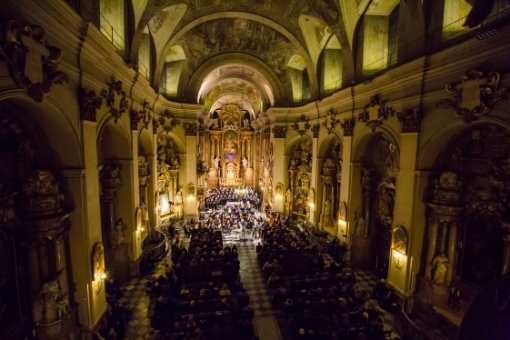Tenebrae, has long been one of the most impressive parts of the Easter Festival of Sacred Music. They are held from Wednesday to Good Friday, always from 9 pm at the Jesuits'. This year, the darkened church, in which candles are burning, will be unusually filled with music commissioned by the festival.
"This is a unique project, and we would be hard pressed to find even an approximate equivalent in the contemporary music world," emphasised Ondřej Múčka, the festival's dramaturge. Six composers of the younger and middle generation were divided into pairs and each composed music for one tenebrae. The pairs were Zdeněk Klauda and Lukáš Hurník, Jaroslav Pelikán and Tomáš Krejčí, Jiří Miroslav Procházka and Ondřej Múčka. The authors set to music the lamentations from the book of Lamentations of the prophet Jeremiah, the texts of the responsories, which reflect the development of the last days of Christ in relation to the Old Testament prophecies, and the text of the penitential psalm Miserere. “The structure of the evensong is the same: each lament is followed by three responsories and the Miserere is sung at the end. Thus, over the course of three evenings, we will hear nine lamentations, all twenty-seven responsories (responses) and three settings of the psalm," Múčka said, adding that the listening will be deepened by the recital of the Czech translation.
What is unique about this year's Tenebrae is not only the close collaboration of all the composers, but also their staging together with a specially created vocal-instrumental ensemble that will take over the interpretation on all three evenings. “We are just today returning from a shared training retreat in Rome and we can't wait to introduce ourselves to the festival audience," said Jiří Miroslav Procházka. The festival begins on Sunday, 24 March 2024 at 8 pm in the Church of St. John on Minoritská Street.
The first pair of authors conceived their compositions as larger works with a more demanding musical language corresponding to the seriousness of the texts.
On Maundy Thursday, the most traditional approach to the texts will probably be heard, with inspiration from medieval church tones in the lamentations and late romantic musical development in the responsories.
The last day of the Tenebrae works with the theme of Jesus' death. The Lamentations make a strong statement against the chosen nation and its transgressions against the Lord, while the responsories work with the darkness of the grave. The musical language of both authors is contemporary, not avoiding spoken or whispered text, albeit very sparingly. The festival offers a total of six concerts and three Tenebrae this year being held in four churches, in the basilica on Mendlovo náměstí Square and in the cathedral on Petrov Hill.













No comment added yet..